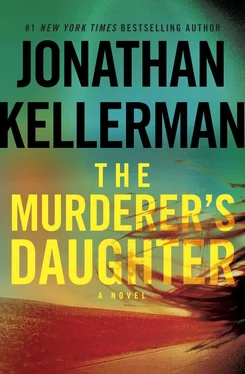Grace moved into his line of vision and waved. He waved back, waited for her to reach him.
“Hi, Grace.”
“Have a second?”
“Sure. What’s up?”
“I’m thinking of getting into martial arts, wondered if you had any advice.”
Delaware’s eyes were a gray-blue that should’ve been cold but weren’t. His pupils had dilated quickly. Serious interest but Grace didn’t detect anything sexual, more like he was really thinking about the request.
He smiled. “Someone told you I’m a sensei?”
“Something like that.”
“Sorry to disappoint you, I just dabble, haven’t done much in a while.”
“Whatever you know, I don’t.”
“Fair enough,” he said. “Are you looking for a good workout or an actual means of defending yourself?”
“Possibly both.”
A couple of undergrad girls in short-shorts passed, giggling. Both gave Delaware the once-over but he didn’t notice. Guiding Grace to a shady bench across from Seeley, he said, “I don’t want to pry, but I can’t give you the best answer without knowing if you’re concerned about a specific threat.”
“I’m not,” she said. “I’m living alone now and this is L.A.”
Everyone knew the reason Grace was alone. Grace was sick of hearing about it and hoped Delaware wouldn’t get into it and, bless him, he stayed on point: “Here’s the thing about karate or any other martial arts system: It’s great for exercise and personal discipline but outside of movie fight scenes, it’s pretty much useless against an armed thug. So if that’s your primary goal, I’d suggest you get some training in deadly assault — similar to what the Israelis do with krav maga but even rougher.”
“Go-for-the-jugular stuff,” said Grace.
Delaware smiled again. “The carotid’s an easier target. One of many.”
She said, “Sounds good. Got a referral?”
“One more thing: If you want to take it a step further, buy a gun and learn how to use it.”
“Do you own a firearm?”
“I don’t. But not because I used to do karate.”
“You lost interest in it?”
“My teacher got old and died, I kept telling myself I’d find another dojo, finally realized I wouldn’t. It’s a fantastic workout, especially for balance, so one day I may get back to it. But up against a knife or a gun?” He shook his head.
“Where would I go for serious assault training?”
Removing his backpack, he took out a pad and pen, wrote down a name.
Shoshana Yaroslav.
“She’s my teacher’s daughter. Back when I was in training, she was just a kid. But she’s grown up.”
“Does she know about guns?”
“Among other things.”
“Thanks, Alex.”
“Anything else?”
“No, that’s it.”
“Hope you find what you’re after,” he said. “Hope you never need it.”
By noon the serene beauty of the beach had frayed Grace’s patience. An hour later, her composure was shredded, every roll of tide clenching her jaws, the tweets and snorts of shorebirds curling her hands into claws.
Locking up the house with no food in her belly and no desire to put any in there, she got in the Aston and drove north aimlessly. Speeding past Neptune’s Net, she continued through the swath of state parkland dynamited decades ago to continue the highway — talk about forced entry.
As she passed the Thornhill Broome dune, an Everest of loose sand used by physical fitness types to test their endurance, she recalled something she’d seen last year: A baby seal had meandered onto the asphalt and been run over.
Maybe vacation was a bad idea; at this moment, she’d pay dearly to rescue anything.
She’d tackled the dune exactly once, avoiding small talk from the only other climber, a steroidal type who showed off by running up the near-vertical grade. Later, having completed the circuit and walking back to her car on PCH, Grace watched him slink behind his Jeep, doubled in agony as he retched and fought for breath.
The climb had winded her, too, but she had nothing to prove and that made for a nice, unruffled life.
In the end, no one cared about you.
Fifteen miles later, the coast highway split: to the west, Rice Avenue and Oxnard’s strawberry fields, storage depots, and gas stations; to the east, Las Posas Road, where Camarillo’s agricultural table presaged that clean, bright town. Choosing the latter, she pumped the Aston to seventy, zipped past artichokes, peppers, and tomatoes. As she neared the Camarillo business district, she slowed because this was a spot cops used to fill their quotas.
Sure enough, just past a wooden shack was a cruiser.
Grace decelerated to five miles under the limit, passed a couple of intersections before coming upon the on-ramps to the 101.
Another choice: northbound or southbound. Randomly, she chose the latter.
Big lie, the decision had been anything but random. But it took her twenty miles to realize it.
An hour after leaving her home, she was back in her office.
In the absence of human interaction, the entire cottage felt sterile and cold and that began to settle Grace down.
A safe place. Here, she determined the rules.
Here she could phone her service, yet again, and not be judged as neurotic because she was simply a responsible practitioner doing her job.
She waited an itchy five minutes before doing so, figuring she needed to test herself, the past day and a half had been... different.
Different required adaptation.
No message from Andrew Toner, nor from any other patient. But a Detective Henke had left a 213 number for callback.
“Did he say what it was about?” Grace asked the operator.
“No, Doctor. And he’s a she.”
She Googled Henke, found no Facebook, just a single citation in a three-year-old Daily News piece on a North Hollywood Division gang bust. Detective Elaine Henke termed the arrests “the culmination of extended teamwork on the parts of LAPD, the district attorney, and the county sheriffs.”
Henke had probably been chosen to talk to the press because she was dependable, media-friendly, knew how to speak bureaucratese.
Three years ago, she’d worked North Hollywood. Today, she’d left a downtown number.
Probably a referral. The only people Grace knew downtown were the occasional prosecutor or D.A.’s secretary who asked her to see patients.
Sorry, Detective, I’m on vacation.
Or not. Let’s hear what Elaine has to say.
She called the number. A girlish pleasant voice said, “Detective Henke.”
“This is Dr. Grace Blades returning your call.”
“Doctor, thanks for getting back to me.” Suddenly serious.
“If this is a referral, I was planning to be out of the office for two weeks. But if it’s an emergency—”
“Actually,” said Henke, “I called about a homicide that I picked up last night downtown — early morning, actually. The victim’s a white male, early to midthirties with no identification, which is the worst thing for us. That’s where I’m hoping you can help us, Doctor. When they got him to the morgue and undressed him they found one of your business cards in his left shoe.”
“His shoe,” said Grace, fighting to keep her voice even.
“Odd, no? Does that physical description mean anything to you?”
The queasy, vertiginous waves that had gnawed Grace since last night were replaced with new discomfort: a sudden, piercing stab of... despair?
Reality catching up with the signals her body had been giving her.
Fighting to sound unruffled, she said, “Can you tell me more than that?”
“Hmm, okay,” said Henke. “Hold on... brown hair, blue eyes, wearing a Harris Tweed sport coat and khaki pants... brown shoes. Kind of generic, Doctor, but I’m afraid that’s it. If only everyone had tattoos.”
Читать дальше












